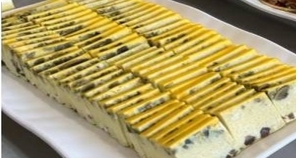SDG 2.2.1 Campus food waste tracking
1. NCUE tightly controls the food waste of its two school cafeterias.
NCUE measures and manages the daily food waste of the two school cafeterias. Statistics showed that the average daily food waste generated by the two school cafeterias in 2022 was lower than 0.022 tonnes. Compared to 2021, the daily average food waste generation at NCUE has decreased by 0.003 tonnes. Please refer to Table 1.
Table 1. Daily Average Food Waste Generation at NCUE
|
Year |
Daily Average Food Waste Generation |
Reduction in Food Waste Compared to the Previous Year |
|
2022 |
0.022 tonnes |
0.003 tonnes |
|
2021 |
0.025 tonnes |
|
Note: The calculation formula is based on the year 2022.
Daily Average Food Waste Generation = Annual Food Waste / Total Working Days in a Year (5 days a week × 52 weeks).
5.72 tonnes / 260 days = 5,720 kilograms / 260 days = 22 kilograms per day = 0.022 tonnes.
2. NCUE has implemented a food waste reduction policy.
(1)NCUE’s food waste reduction policy is as follows:
(a)Promoting nutrition education and food appreciation, and encouraging students to take only what they can eat, not pick at food, and not leave leftovers.
(b)Requesting vendors to estimate the number of diners for food preparation.
(c)Regularly assessing the food waste situation and adjusting the menu accordingly.
(d)Implementing time-limited promotional offers to reduce leftovers. For details on the school cafeteria's promotional measures, please refer to Annex 2.1.1A.
(2)As part of NCUE’s food waste reduction policy, the two school cafeterias classify the daily food waste generated with food waste bins placed in both school cafeterias. Specially appointed cleaners collect the food waste every day, and designated enterprises regularly collect the food waste for resource recycling. The methods and strategies for reducing food waste are as follows:
(a)NCUE adopts a standardized production process when preparing meals that uses ingredients effectively and reduces the serving portions to ensure that the teachers and students can finish all their food, reducing waste. (Figure 1)
|
|
|
Figure 1. The small portions of delicious foods offered in the student cafeterias of NCUE. |
(b)NCUE regulates the selection, purchase, and management of ingredients to ensure that vendors’ procurement, processing, and inventory follow standard procedures. Vendors closely monitor the inventory and freshness of all kinds of food to ensure safe and effective use. Food nearing its expiration date is made into ‘light lunch boxes’ or ‘lunch boxes under 50 NTD’ to promote sales, reduce waste, and ensuring food safety. The cafeterias’ effective use of ingredients enables teachers and students to enjoy nutritious food at low prices to reduce their financial burden and food waste.
Please refer to Annex 2.1.1A for details on School Cafeteria Discount Measures.

